Dr. Seuss and Philosophy
Dr. Seuss and Philosophy
Oh, the Thinks You Can Think!
edited by
Jacob M. Held
Rowman & Littlefield Publishers, inc.
Lanham Boulder New York Toronto Plymouth, UK
Published by Rowman & Littlefield Publishers, Inc.
A wholly owned subsidiary of The Rowman & Littlefield Publishing Group, Inc.
4501 Forbes Boulevard, Suite 200, Lanham, Maryland 20706
http://www.rowmanlittlefield.com
Estover Road, Plymouth PL6 7PY, United Kingdom
Copyright 2011 by Rowman & Littlefield Publishers, Inc.
All rights reserved . No part of this book may be reproduced in any form or by any electronic or mechanical means, including information storage and retrieval systems, without written permission from the publisher, except by a reviewer who may quote passages in a review.
British Library Cataloguing in Publication Information Available
Library of Congress Cataloging-in-Publication Data
Dr. Seuss and philosophy : oh, the thinks you can think! / edited by Jacob M. Held.
p. cm.
Includes bibliographical references.
ISBN 978-1-4422-0311-2 (pbk. : alk. paper) ISBN 978-1-4422-0312-9 (electronic)
1. Seuss, Dr.Criticism and interpretation. 2. LiteraturePhilosophy. 3. Childrens stories, AmericanHistory and criticism. I. Held, Jacob M., 1977 II. Title: Doctor Seuss and philosophy.
PS3513.E2Z65 2011
813'.52dc22
2011006488
 The paper used in this publication meets the minimum requirements of American National Standard for Information SciencesPermanence of Paper for Printed Library Materials, ANSI/NISO Z39.48-1992.
The paper used in this publication meets the minimum requirements of American National Standard for Information SciencesPermanence of Paper for Printed Library Materials, ANSI/NISO Z39.48-1992.
Printed in the United States of America
Dedicated to those teachers who impressed upon me through their words and deeds that learning is about growing as an individual, and who helped me grow immenselyespecially Dr. James B. South and Ken Fought
Preface
When I first started college I was ecstatic. I was finally in a learning environment where I could take a class on anything I could imagine; where I was in control of my educational destiny. So I started looking for courses on topics I hadnt had before, courses beyond the simple English, history, and various sciences I had been instructed in since I was five. I saw Philosophy 151 and thought Id try it out. While discussing my future class schedule with my dad, I asked him what philosophy was. He replied, and I paraphrase, The only people who study philosophy are future philosophy professors. It wasnt hard to read between the lines: philosophy was a waste of time. I took it anyway. What I found was eye-opening. I discovered the history of humanitys collective attempts to understand, contextualize, and discern the meaning of existence, from politics, law, and ethics to God, art, and science. I could not think of anything more profound or important. But at the same time, I noticed no one else was taking these classes. On a campus where an introductory zoology lecture may have upward of two hundred students, my philosophy courses would max out at about fifteen. Philosophy was also the butt of jokes. It was treated as a flaky, irrelevant pastime, not a legitimate area of study. So it did seem as if only those interested in becoming philosophy professors took philosophy courses, and what a shame. It was in those classes that I found an appreciation of and engagement with ideas that have defined and continue to influence our culture and our very existence as a human race. So I decided to become one of those philosophy students who wanted to teach philosophy. But it wasnt out of necessity; its not that all you can do with a degree in philosophy is teach. Philosophy is a love of wisdom, and with wisdom you can do anything, usually better than most, including the most important thing of all, live well. I decided to teach because I had concluded at the end of my first semester at college that I was never going to leave campus. I loved being surrounded by curious, bright people discussing everything under the sun. Regardless of what I had majored in, I would have become a professor of it. Philosophy just struck my fancy. It covered every facet of the human experience. My enthusiasm translated into a desire to open up the world to others in the way it had been opened to me. I have been lucky enough to be in the position for some years now to do just that. But I still have to fight against the prevailing attitude that philosophy is worthless. Its not my dad with whom I have to deal, but students and their parents, who want to know, What can you do with a philosophy degree? I cant answer this question. Or rather I can, but no answer will satisfy those who ask this question. Whoever asks this question already presumes that an education is only as good as the job it secures, and whatever isnt a hirable skill isnt worth developing. But college isnt about getting a job; its about getting an education, and an education is about developing the whole person. Music, art, history, philosophy, religion, as well as sciences, math, and whatever job training you get in Business 101 are all part and parcel of your growth as a person. Philosophy trains you to be open, thoughtful, and resourcefula genuinely sharp, bright, and creative human being. This is valuable whether you get a job or not. Thankfully, there has been a recent trend in philosophy to popularize the discipline and bring it to a general audience. This trend is almost exclusively due to William Irwin and his wildly successful series on philosophy and popular culture, to which I have contributed previously. This use of popular elements to disseminate philosophical wisdom is useful both as a public relations move for my discipline but also in promoting the goal of philosophy, which is living well through a critical and reflective attitude. This book was produced in the same spirit. However, it is markedly different than other similar volumes in one regardit is meant to be an introduction to philosophy in general. This is why I chose to
focus on Dr. Seuss. From the outset I wanted to offer an accessible and
fun introduction to that tradition that inspired me so many years ago. What I have sought to produce, with many thanks to my wonderful, helpful, and accommodating contributors, is an introduction to major themes and traditions in philosophy through an aspect of popular culture with which almost everyone is familiar, Dr. Seuss. This introduction isnt exhaustive, its merely a window into a discipline, but hopefully opening that window will let in a breath of fresh air and open the readers eyes to the fact that it truly is opener there in the wide open air (Oh, the Places Youll Go).
Acknowledgments
I would like to acknowledge all of those who supported me during the completion of this project, from my loving family to all of my contributors. I would also like to thank those colleagues/friends who have kept me sane over the years by being supportive, helpful, and always willing to lend an ear not only for my ideas but also my gripes. They remind me daily why we do what we do, and their company and support are appreciated more than they will ever know. Thank you, Ron and Tanya. In addition Id like to acknowledge the University Research Council at the University of Central Arkansas for awarding me a summer stipend during the summer of 2010 to assist in completing this volume.
Editors Note
Many of Dr. Seusss works are not paginated, which can make citing them tricky. Luckily, the books are quite short, so if anyone wants to know on what page a reference occurs they merely have to flip through until they find it. So in order to make things simpler and to avoid vast amounts of endnotes, all references to Seusss works will be parenthetical according to the key below. All works are published by Random House.

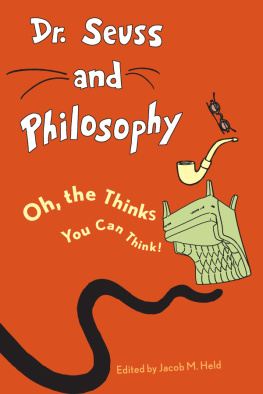

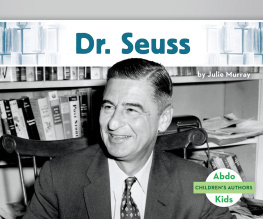
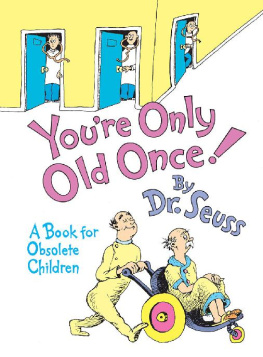
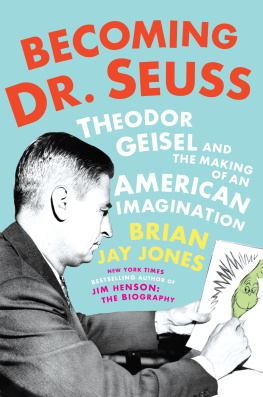
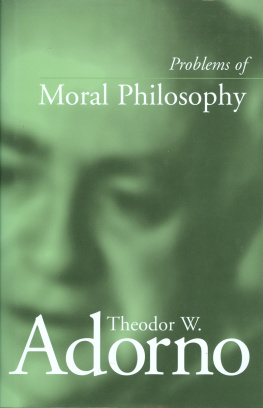
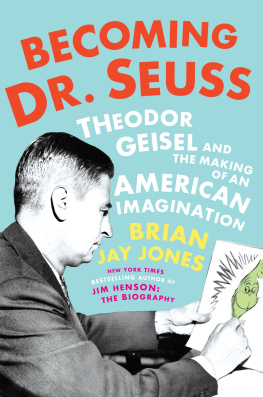
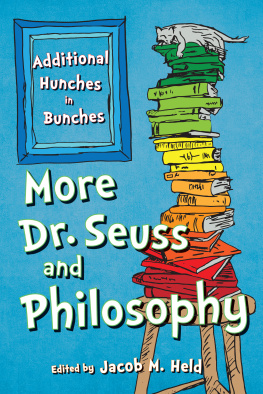
 The paper used in this publication meets the minimum requirements of American National Standard for Information SciencesPermanence of Paper for Printed Library Materials, ANSI/NISO Z39.48-1992.
The paper used in this publication meets the minimum requirements of American National Standard for Information SciencesPermanence of Paper for Printed Library Materials, ANSI/NISO Z39.48-1992.